
Imaam Muslim -rahimahullaah- reported in his “Saheeh” (The Book of Remembrance, Supplication, Repentance, and Seeking Forgiveness):[no. 2722]:
“Aboo Bakr ibn Abee Shaybah, Ishaaq ibn Ibraaheem, and Muhammad ibn `Abdillaah ibn Numayr narrated to us -and the wording is that of Ibn Numayr: Aboo Mu`aawiyah (Ishaaq said: “He related to us”; and the other two said: “He narrated to us”): from `Aasim: from `Abdullaah ibn al-Haarith; and from Aboo `Uthmaan an-Nahdee: from Zayd ibn Arqam, who said: “I do not say to you except that which Allaah’s Messenger صلى الله عليه وسلم used to say. He used to say:
اللَّهُمَّ إِنِّي أَعُوذُ بِكَ مِنَ الْعَجْزِ وَالْكَسَلِ وَالْجُبْنِ وَالْبُخْلِ وَالْهَرَمِ وَعَذَابِ الْقَبْرِ
اللَّهُمَّ آتِ نَفْسِي تَقْوَاهَا وَزَكِّهَا أَنْتَ خَيْرُ مَنْ زَكَّاهَا أَنْتَ وَلِيُّهَا وَمَوْلاَهَا
اللَّهُمَّ إِنِّي أَعُوذُ بِكَ مِنْ عِلْمٍ لاَ يَنْفَعُ وَمِنْ قَلْبٍ لاَ يَخْشَعُ وَمِنْ نَفْسٍ لاَ تَشْبَعُ وَمِنْ دَعْوَةٍ لاَ يُسْتَجَابُ لَهَا
Allaahumma innee a`oodhu bika minal-`ajzi wal-kasali wal-jubni wal-bukhli wal-harami wa `adhaabil-qabr. Allaahumma Aati nafsee taqwaahaa, wa zakkihaa, Anta khayru man zakkaahaa, Anta Waliyyuhaa wa Mawlaahaa. Allaahummaa innee a`oodhu bika min `ilmin laa yanfa`u, wa min qalbin laa yakh-sha`u, wa min nafsin laa tashba`u, wa min da`watin laa yustajaabu lahaa.
“O Allaah! I seek your refuge from incapacity, laziness, cowardice, miserliness, decrepit old age, and punishment of the grave. O Allaah! Grant my soul its dutifulness (taqwaa), and purify it, You are the One to purify it: You are its Guardian and its Lord. O Allaah! I seek Your refuge from knowledge that does not benefit, and from a heart that is not humble, and from a soul that is never satisfied, and from a supplication that is not answered’.”
Also reported by Ahmad (4/371), at-Tirmidhee (no.3572) -in abridged form, and by an-Nasaa·ee (no.5458).
Imaam Aboo Zakariyyaa an-Nawawee -rahimahullaah- (d.676 H) said in his explanation of “Saheeh Muslim”:
“This hadeeth, and others besides it, which occur in rhyming form, are a proof for what the scholars say: that what is blameworthy regarding making it in rhyming form is that which is artificially contrived, for that removes humility, submissiveness, and sincerity; and it diverts from humble beseeching, showing ones state of need, and ones heart being free from preoccupation. As for that which is done without artificial contrivance, and without having to apply thought, due to a persons eloquence and the like, or it is something memorized, then there is no harm, rather it is something good.
And the meaning of (a soul that is never satisfied) is seeking refuge from craving, covetousness, and greed; and from the souls becoming attached to distant hopes;
and the meaning of (purify it) is to cleanse it;
and the word “Khayr” (the best One) is not to show excellence over others, but rather its meaning is: no one can purify it except You; just as he said: “You are its (only) Guardian.”
Imaam Abul-`Abbaas al-Qurtubee -rahimahullaah- (d.656 H) said in his explanation of “Saheeh Muslim”, “al-Mufhim” (7/50):
“(O Allaah! I seek Your refuge from knowledge that does not benefit): it is that which is not acted upon…”
al-Haafiz Muhammad `Abdur-Rahmaan al-Mubaarakfooree -rahimahullaah- (d.1353 H) said in his explanation of the “Sunan” of at-Tirmidhee, “TuhfatulAhwadhee”(10/14):
“(From cowardice):…i.e. from being miserly with ones soul, and not being brave upon obedience; and he sought refuge from it because it leads to punishment in the Hereafter, because he will flee from the battlefield, and enter under Allaah”s threat of punishment: for one who flees has earned Anger from Allaah; and he may be put to trial in his Religion, and so turn apostate, because of cowardice overcoming him, and his fear of falling into captivity and enslavement;
(…miserliness ):…i.e. from failing to benefit others with wealth and knowledge, and with other than these two; even if it be with sincere advice. at-Teebee said: “Generosity is either with ones soul, which is bravery, and its opposite is cowardice; or with wealth, and it is to be generous in giving, and its opposite is miserliness; and bravery and generosity will not be found combined except in a soul that is complete; and they will not both be absent except in one that is at the limit of deficiency;
…(… decrepit old age):…it is senility, such that a person returns to being how he was initially, when he was a baby: weak in his body, weak in his intellect, weak in his comprehension;…it is the state of senility, and of being to weak to carry out the obligatory duties, and to take care of himself with respect to cleaning himself; so he becomes dependent upon his family; a burden to them, and they wish for his death; and if he has no family, then the calamity is worse…
( and from punishment of the grave): meaning from that which necessitates its punishment…”
Mullaa `Alee al-Qaaree said in his “Mirqaatul-Mafaateeh” 95/369):
“(O Allaah! I seek your refuge from incapacity): meaning inability to perform acts of obedience, and lacking the strength for worship; (and laziness): meaning being sluggish to do good;
(cowardice): i.e. lacking the courage to oppose ones soul and Satan;
(and miserliness): i.e. withholding from spending ones wealth in the ways pleasing to the Lord; (and decrepit old age): i.e. becoming senile, and decrepit old age, such that after having knowledge he returns to a state of knowing nothing;
(and punishment of the grave): with respect to tightness, darkness, desolation; and being struck with iron clubs, and bitten by scorpions, snakes, and the like; or from the punishment that comes about in it for carrying tales, and for not cleaning oneself, and the like;
(O Allaah! Grant): i.e. give; (my soul its dutifulness):: i.e. that it is safeguarded from forbidden things. at-Teebee said: It is befitting that “taqwaa” is explained to be that which is opposite to acts of evil, as in His Saying -He the Most High:
فَأَلْهَمَهَا فُجُورَهَا وَتَقْوَاهَا
[Sooratush-Shams (9):8]
[[Meaning: So He made him aware of acts of obedience and acts of disobedience]];
and it is to be on ones guard against following ones desires, and committing sinful and shameful acts, because the hadeeth is like an explanation and a clarification of the Aayah. So his saying ‘Grant” shows that the meaning of (al-ilhaam) “inspiring/giving awareness” in the Aayah means creating the impulse which leads him to avoid the things mentioned;
and his saying (and purify it, You are the One to purify it): shows that the purification of the soul mentioned in the Aayah is an ascription of something earned by the servant, not creation of the action by him -as is claimed by the Mu`tazilah…;
( You are its Guardian): i.e. the One Who supports and aids it. This relates back to his saying “Grant my soul its dutifulness“. it is as if he is saying: Aid it upon doing whatever will be a means to Your being pleased with it, since You are its Guardian; (and its Lord): this relates back to his saying “and purify it”, i.e. cleanse it, by Your correcting and disciplining it just as a master disciplines a slave…;
(O Allaah! I seek Your refuge from knowledge that does not benefit): at-Teebee said: meaning knowledge which I do not act upon, and which I do not teach to the people; and which does not refine manners, sayings, and actions; or knowledge which is not needed in the Religion; or which no permission occurs in the Religion to teach it…;
(and from a heart that is not humble): i.e. that does not find peace and calmness in the remembrance of Allaah;
(and from a soul that is never satisfied): with that which Allaah has given it; and it does not suffice itself with the provision given to him by Allaah; so he never wearies of amassing wealth, because of his great craving; or from a soul that eats a great amount. Ibnul-Malik said: Meaning its eagerness upon amassing wealth and acquiring positions; or it is said: it is upon what is apparent from it: either on account of his craving: his craving for this world, such that he is unable to devour enough to remove his hunger; or that the hunger of cows overcomes him, which is hunger of the body parts, even when the stomach is full: opposite to the desire found in dogs; (and from a supplication that is not answered)…”
***
[Translated by Aboo Talhah Daawood ibn Ronald Burbank rahimahullaah]
Read the Explanation of this du’a [PDF]
Posted from: https://alitisaambissunnah.wordpress.com
Share this, Baarakallaah Feekum: [“One who guides to something good has a reward similar to that of its doer” - Saheeh Muslim vol.3, no.4665]


![Whoever recites these words (before going to bed) and dies the same night, he will die on Al-Fitrah [the Islamic religion (as a Muslim)]](https://muslimfortress.files.wordpress.com/2017/08/whoever-recites-these-words-before-going-to-bed.png?w=663)


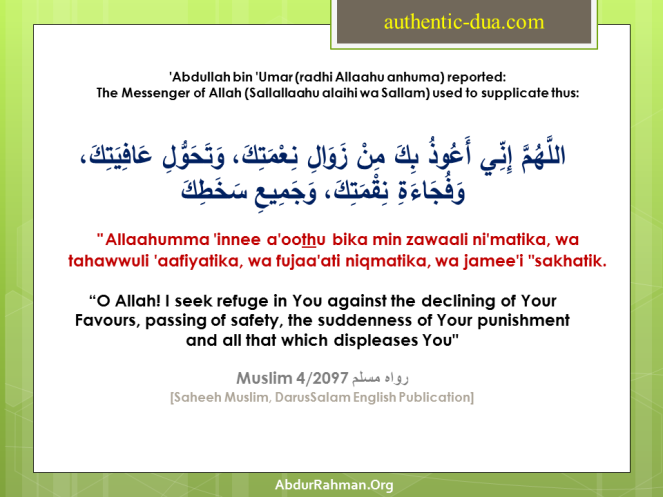
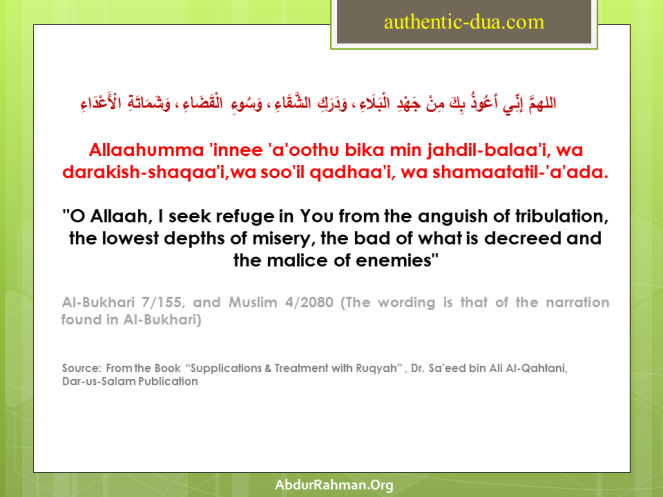


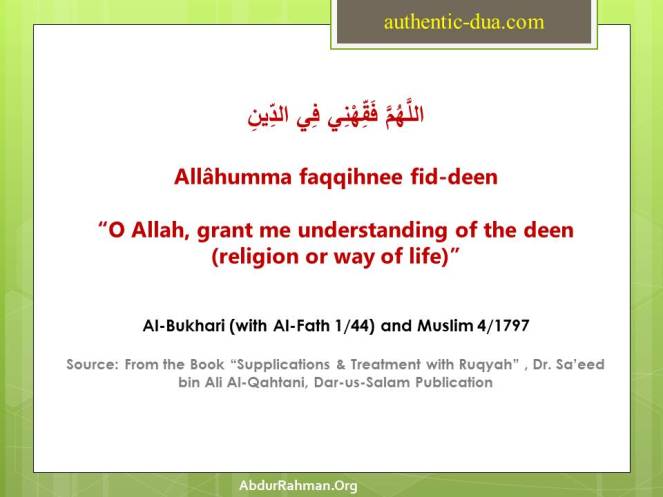
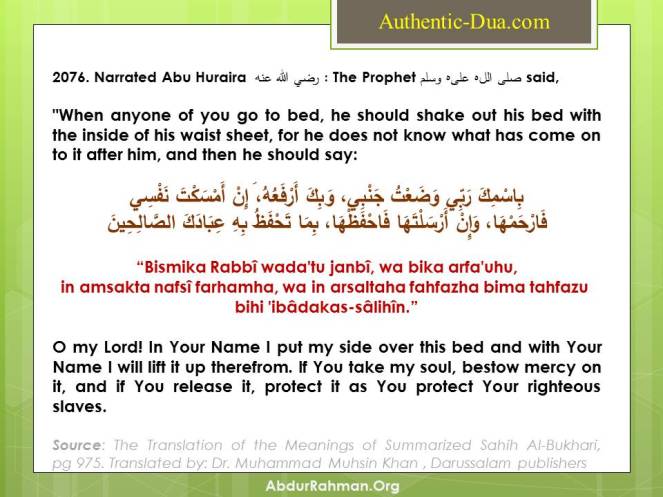


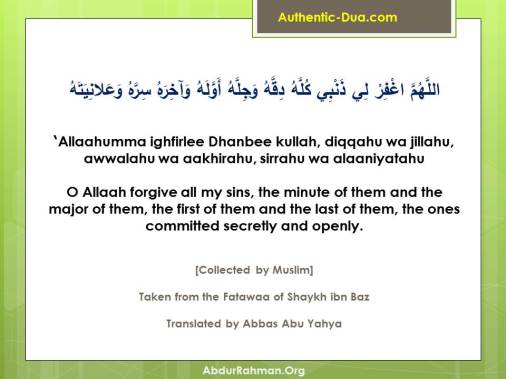









You must be logged in to post a comment.